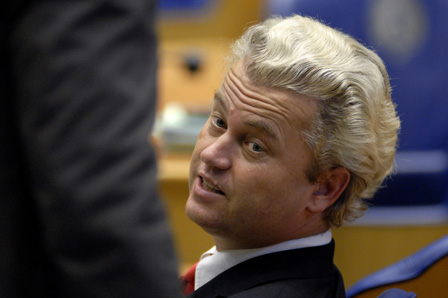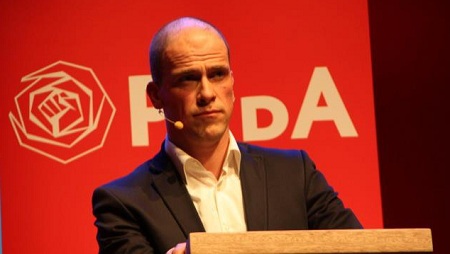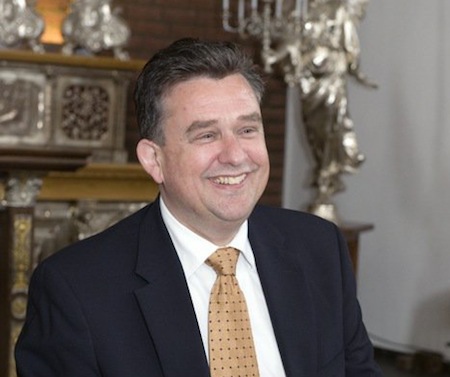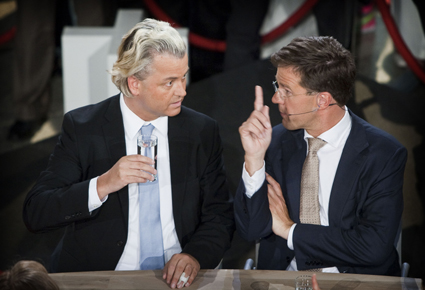
The past decade in Dutch politics has been fraught with what in the United States would be called “culture war” issues.
It may be surprising when you think of the Netherlands and its liberal attitude towards many of the hot-button issues in the U.S. — marijuana legalization, euthanasia, prostitution, same-sex marriage — but the Netherlands has had more than its share of tensions over Muslim immigration in the past decade.
The current standard-bearer of anti-Islam politics is Geert Wilders, somewhat of a Dutch Cultural Warrior, version 2.0 (following in the tradition of the late Pim Fortuyn, filmmaker Theo van Gogh and, to some degree, former Dutch parliamentarian Ayaan Hirsi Ali). Wilders, the platinum blonde enfante terrible of Dutch politics, has highlighted the influx of Muslim immigrants to the Netherlands as a threat to the culture and way of life of the Netherlands (and Europe, generally).
His Partij voor de Vrijheid (PVV, Party for Freedom) swept the last general election in 2010, winning nearly one-sixth of the seats in the Tweede Kamer, the third-highest total.
Wilders dominated that election campaign with his views — he would ban all Muslim immigration to the Netherlands, pay current immigrants to leave and ban the Koran. He then dominated the months of coalitions talks that resulted when no party won enough seats to govern. And then, as an outside supporter of Mark Rutte’s government, he has dominated Dutch governance — right up to April 2012, when he withdrew his support for additional budget cuts, leading to the snap elections on September 12.
So it’s with some surprise to see that the PVV is not dominating this election campaign: polls show that Rutte’s liberal, free-market Volkspartij voor Vrijheid en Democratie (VVD, the People’s Party for Freedom and Democracy) is tied with Emile Roemer’s Socialistische Partij (SP, the Socialist Party). Rutte is running a campaign defending his push to bring the Dutch budget within 3% of Dutch annual GDP, while Roemer (and not Wilders) has emerged as the voice of opposition to austerity.
What’s clear is that, for the first time in over a decade, next month’s Dutch election is about spending, growth and the economy and less about Muslim immigration and ‘culture war’ issues — and early polls indicate that Wilders has not been as germane to the 2012 debate as he was in 2010.
Maybe it’s because Wilders has been so thoroughly identified as an anti-Muslim candidate (rather than an anti-Europe or anti-austerity). Maybe it’s because there’s no mistaking the message of anti-austerity that voting for the Socialists sends. Maybe it’s because Wilders originally provided support to prop up Rutte’s minority government.
But for whatever reason, Wilders has watched Roemer’s party rush to the front of the pack. Although Wilders would normally seem mostly likely to benefit from a strong protest vote this year, he’s been relegated to watch as the unlikely Roemer drinks his milkshake — Wilders and the PVV remain trapped in a four-way tie for third place alongside the progressive Democraten 66 (Democrats 66) bloc, and the two struggling parties that dominated postwar Dutch politics until the last decade, the center-right Christen-Democratisch Appèl (CDA, Christian Democratic Appeal) and the center-left Partij van de Arbeid (PvdA, Labour Party). It’s a little odd, considering that Wilders has a populist style that dwarfs that of either the technocratic Rutte or the plodding Roemer.
That doesn’t mean Wilders is going down gently, and Dutch voters are just starting to tune into what’s been a subdued campaign that coincides with summer holiday season.
His latest bid has been to expand his brand of populism to Europe — the PVV’s platform for 2012 reads, “Their Brussels, Our Netherlands.” In typical Wilders fashion, it’s not nuanced — it proclaims, “other parties may choose Islam or EU nationalism, our party is for the Netherlands!” Continue reading The incredibly shrinking Geert Wilders →
![]()







